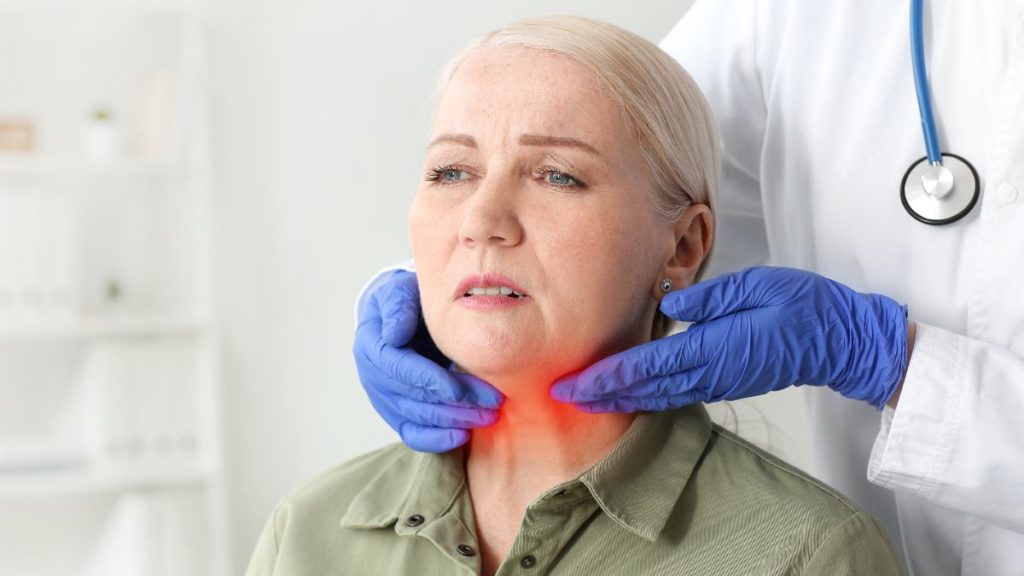
What and where is the thyroid gland?
The thyroid is a small butterfly-shaped gland that sits in the front of the neck, just below the Adam’s apple. Its main function is to release hormones into the bloodstream, which are needed for our cells to work normally. Thyroxine (T4) and its active form Triiodothyronine (T3) have lots of different effects, including on our metabolism, physical growth and mental health. The release of T3 and T4 is regulated by feedback from a small gland in the brain (the pituitary) which secretes Thyroid Stimulating Hormone (TSH).
What are the symptoms of thyroid disorders?
Hypothyroidism is when the thyroid is underactive, and there is not enough thyroxine to meet our body’s needs. Common symptoms include fatigue, weight gain (even though you may be eating less!), poor concentration and memory, feeling very cold, hair loss, heavy periods and lack of libido.
Hyperthyroidism is an overactive thyroid gland, and there is too much thyroxine circulating in the body. Symptoms can include weight loss, anxiety, agitation, palpitations, tremors, feeling very hot, and sore or gritty eyes.
Occasionally, there may not be anyone predominant symptom, instead, you may just not be feeling yourself. This is called subclinical thyroid disease, and any thyroid result which is not normal still needs to be monitored to prevent it worsening.
Post-partum thyroiditis involves inflammation of the thyroid following pregnancy and may involve hyperthyroidism, hypothyroidism or the two successively. Affecting about 5% of women within a year postnatally, it deserves a special mention as symptoms can be difficult to distinguish, as there is significant overlap with the daily stresses of being a mum.
What causes thyroid problems and how common is it?
Hypothyroidism affects between 1-2% of the UK population and is 10 times more common in women than men. The prevalence of hyperthyroidism in the UK is about 1% and it is about six times more common in women. There are many different causes of thyroid disorders. However, the commonest is autoimmune disease; essentially a self-destructive process when the body sees the thyroid as a foreign organ and attacks itself.
How are thyroid disorders diagnosed?
During your consultation, we will take an extensive history of your present health including any symptoms, and perform a full medical examination including your neck. This will be followed by us taking a small sample of blood from the vein, which will allow us to test your thyroid status. Results are typically available within 24 hours. If there were any unusual findings of the neck such as the thyroid being enlarged or having a lump then we would refer you for an ultrasound scan (preferably same day), and you may also need a biopsy.
Thyroid function tests (TFTs) explained
Most T3 and T4 circulating in the blood is attached to transport proteins. Only a minute fraction is free (unbound) and biologically active, so measuring free thyroid hormones can be of great diagnostic value. Free T3 is 4 to 5 times more potent than free T4.
The initial screening thyroid function tests include looking at levels of free T4 and TSH. If these are outside the reference range, we order additional tests.
The free or total T3 test is usually ordered following an abnormal TSH, particularly if the free T4 is not elevated. It is ordered primarily to help diagnose hyperthyroidism and may be ordered to help monitor treatment of a person with a known thyroid disorder.
Finally, we may also send off for thyroid antibodies to help our diagnosis of autoimmune disease. The most frequent are Antithyroid Peroxidase Antibody (TPO Ab), Antithyroglobulin Antibody (TG Ab) and Thyroid Stimulating Immunoglobulin (TSI Ab). Any level of antibody titre should be regarded as at least potentially suspicious of future illness, and so would need to be monitored.
Is there any treatment?
Thyroid disorders most definitely can be treated. The majority of thyroid disorders are treated with daily medication to replace any deficiency or reduce excess. There are also medications to help manage symptoms.
If you are diagnosed with hypothyroidism, we will start treatment straight away. Hyperthyroidism usually requires specialist input from the endocrinologist. Sometimes, thyroid disorders cannot be controlled with medication, and in these cases, treatments with radioiodine or surgery may be required. Read more on Endocrinology


2 Responses
Thanks for sharing this valuable information.
Many thanks for your comment.